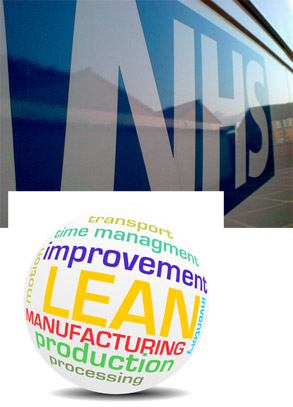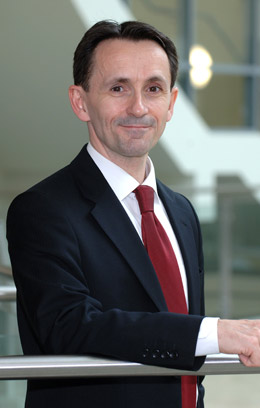‘Lean thinking’ – the way to improving the NHS for patients

Tue, 04 Mar 2014 13:10:00 GMT
Professor applies Toyota’s ‘lean thinking’ system to improve NHS’s approach to budgets and patients’ needs
A MANAGEMENT system devised so that giant car manufacturers could stay ahead of the competition has been adapted by a University of Huddersfield professor to help the NHS make the best use of its budget and respond as closely as possible to patients’ needs.
The approach is named “Lean Thinking” and Professor David Bamford (pictured below) and his colleagues have carried out a succession of projects with NHS trusts in Yorkshire that apply its tenets to healthcare.
One Knowledge Transfer Project (KTP) with the Bradford NHS Trust led to the development of a new and efficient patient transport system, while another Economic and Social Research Council (ESRC) founded project, with the South West Yorkshire Trust, aided the improvement of the Single Point of Access performances for mental health services.
Professor Bamford led this Knowledge Exchange Project and received £105,962 from the ESRC in order to disseminate Lean Thinking throughout the NHS, so that decision-making is streamlined and waste is reduced. A series of seven workshops plus a large-scale dissemination event at the University of Huddersfield have helped to spread the message.
“The healthcare budget within the UK is finite, so if you make processes and systems more efficient you get more out of the money that you have,” said Professor Bamford. “We have proven that if you redesign the systems and take out the factors that do not add value, then that makes them more efficient, leading to the patient getting a better level of service.”
 Lean Thinking
Lean Thinking
The principles of Lean Thinking – the removal of all non-value-added activities, the focus on the customer needs and requirements and the continuous improvement approaches – were developed by Toyota from the 1950s as their strategic system to help the car firm to compete commercially. More recently, Professor Bamford – who is Professor of Operations Management at the University of Huddersfield’s Business School – has played a leading role in adapting these concepts for public services, with a special emphasis on healthcare.
But there are limits to the extent that Lean Thinking can be applied to the NHS, concedes Professor Bamford.
“For example, if you applied the idea to the blood transfusion service, it just wouldn’t work. You have to have plenty of stock and spare capacity. Similarly, within an A&E department you need to keep some flexibility with additional medical staff and physical space for capacity.”
“But there are other areas where if you look at the procedures, you can make them better fit for purpose.”
Improving things for patients
Professor Bamford – working with a University of Huddersfield’s colleague, lecturer Benjamin Dehe – has also carried out research on the use of Lean Thinking in the planning and design of new healthcare infrastructure. Here, they were prepared to take guidance from different best practices in the world of construction and other industries, for instance learning from McDonald’s, the international fast food chain.
“They serve 65 million people a day globally and very carefully place their restaurants and make them just the right size so that they achieve the most impact. We have taken some of those algorithms and applied them to healthcare.”
Greater transparency has also been introduced, with added input to building design and planning from the public and from patient/user groups.
“With the rise of Clinical Commissioning Groups and the idea that healthcare has to move from traditional hospitals into the community – which is often much more appropriate for patients – there is the opportunity for better service,” said Professor Bamford. “The challenge is to make sure that the systems, the procedures and everything surrounding them are fit for purpose.”
Professor Bamford remains in close contact with the NHS trusts, so that he can keep the ESRC informed on the progress of his projects.
“What we hope to do is improve things for patients and this is a way for the University to have an impact on society. So we will continue to work in this field. It is very rewarding to make a tangible difference to patients’ lives and we have evidence that the advice and the systems we are bringing with us can make a real difference.”







